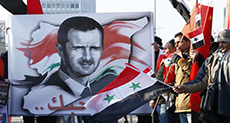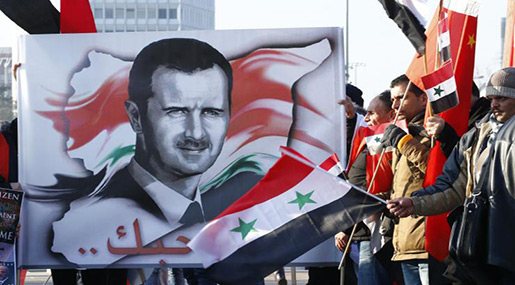Is Victory Really Possible in Syria?

Sami Kleib
On March 30 2011, Syrian President Bashar al-Assad gave his first speech after the fighting broke out in his country. He said: "Crises are positive situations if we are able to take control of them, and come out of them victorious...and it is better to keep them without solutions if we are uncertain about the proper solutions." His opponents replied right away that he is disconnected to reality, and predicted he will leave soon.

He did not. (Rather), (today) he is mocking the prime minister of Britain by saying: "They are disconnected to reality, otherwise, they would not have asked to do this referendum," describing the Brexit as "a second degree revolution against politicians." Undoubtedly, the breakup of the European Union delights Bashar, and grants Putin a precious gift.
What are the Main Developments?
- With the exception of Saudi Foreign Minister Adel al-Jubeir, international calls for Assad to leave has become a way to kind of prevent themselves from being blamed. Terrorism is the priority. Assad is talking about indirect cooperation with Western countries. The Syrian army is fighting with exceptional consistent, which major countries failed to do. Here is one of the famous former French prime ministers, the French socialist theorists Michel Rocard, said in an interview with the French magazine "Le Point": "We have underestimated Assad's ability.
Amidst such sectarian diversity in Syria and Lebanon, Bashar was able to maintain the regime, and we did not pay attention: "we were hasty and France took the initiative to establish and support the Syrian National Coalition of the opposition, of which half its members came out of prison and do not have the culture to influence, and the Foreign Minister Laurent Fabius caused astonishment within our intelligence apparatus by paralysing its work." When the journalist says that most of the opposition factions are masks for Al-Qaeda and other groups, Rocard answers without hesitation: "Yes. There is no doubt that the disintegration and dispersion of the Syrian opposition put forward to Assad the best favour which he had never dreamt of."
- The easing of the Russian-Turkish crisis after Recep Tayyip Erdogan's apology for shooting down the Russian fighter jet and the Turkish Foreign Minister's visit to Moscow, involved talk about military contacts between the two sides and accelerating the (establishment) of a political solution in Syria. Moscow wants Tehran and Ankara to accommodate the neutralization and weakening of the Saudi role. This is important as the decision (to liberate) Aleppo may have actually been taken, this in line with what Sayyed Hassan Nasrallah revealed in the second-last speech he delivered. It seems to have already been taken according to Syrian sources.
- The visit of the Secretary of the Supreme Council of Iranian National Security, Ali Shamkhani, to Moscow, and his meetings with senior officials, including Defence Minister Sergei Shoigu and the Special Representative of the Russian President to Syria, Alexander Aurrentev, involved discussions surrounding a new offensive strategy in Syria on the grounds that the international and regional climate was favourable. Iranian Defence Minister Hossein Dehghan has said that "the areas occupied by terrorists in Aleppo, Syria, will be liberated by the forces of the axis of resistance", a point also made by Sayyed Hassan Nasrallah two weeks ago.
- The day after US President Barack Obama received the deputy Saudi Crown Prince Mohammed bin Salman on 18 June, Putin dispatched his Defence Minister Shoigu on a surprise mission to Syria. Such things do not happen by accident. All these Russian Syrian-Iranian meetings came after the ambiguous Russian position regarding Aleppo, which was expressed by Nasrallah's blaming and angry questions, including: "Who benefited from the ceasefire in Aleppo?"
- Assad surprised everyone by saying in an interview with Australian television that America "is not our enemy, nor does it occupy our land," and cooperation with it is possible, but on the basis of common interests. Is he courting it, or (is it aimed at) facilitating the work of the Russian ally with it, or did he say it because he was addressing a Western audience? All this is possible in spite of the difficulty of restoring confidence now.
Is there something under the table?
Certainly not. Syria will remain for a long time to come, a scene for NATO-Russian conflict. This at a time when the Europeans added new sanctions on Russia, NATO deployed brigades and batteries in the Baltic states and Poland, and as it holds military exercises in the Black and Baltic seas. All this moved Putin to issue a warning: "The hostile orientation by NATO towards Russia has been completely unveiled. But we will not show weakness. And we can still protect ourselves well." This is what Assad meant when he said that Iran and Russia are also fighting in Syria for their interests. Russia's return to the battlefield is inevitable, even if after a short while.
No matter how many achievements the Syrian army and its allies produce in Raqqa, rural areas, on the southern front and others, Aleppo remains the turning point, and not between Syrian parties, but on the regional and international levels. That is exactly where the danger lies, this danger beginning to show signs in the Lebanese (town) of al-Qaa, Turkish airports, and perhaps soon in many other places. This is because terrorism has suffered a major setback in Fallujah, and it is trying to avoid the biggest and most serious setback in Aleppo, or in Raqqa and other places. It wants to diversify the fronts and intensify the attacks, but no doubt is currently receiving painful blows.
As for the political negotiations, it is sufficient to read the opinion of Assad on the opposition in his last interview, when he said that it was "a proxy for other countries" and "worthless in Syria", in order to understand that he is still of the same view that he had since 2011. That is, not to accept any solution that is not appropriate. Perhaps the opposition's disunity and dispersion between capitals and other places granted him the most beautiful gift.
The French philosopher and writer Victor Hugo once said, "War is the war of human beings, and peace is the war of ideas." It seems that we are still within the war between human beings, it is a short period in a war in which it is hard to imagine a victor in it amid an international conflict, but it is even harder to imagine defeated (sides). From this comes its coming ferocity.
Source: As-Safir, Translated and Edited by website team
Comments




